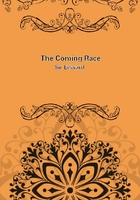
第14章
It was not for some time, and until, by repeated trances, if they are to be so called, my mind became better prepared to interchange ideas with my entertainers, and more fully to comprehend differences of manners and customs, at first too strange to my experience to be seized by my reason, that I was enabled to gather the following details respecting the origin and history of the subterranean population, as portion of one great family race called the Ana.
According to the earliest traditions, the remote progenitors of the race had once tenanted a world above the surface of that in which their descendants dwelt. Myths of that world were still preserved in their archives, and in those myths were legends of a vaulted dome in which the lamps were lighted by no human hand. But such legends were considered by most commentators as allegorical fables. According to these traditions the earth 32itself, at the date to which the traditions ascend, was not indeed in its infancy, but in the throes and travail of transition from one form of development to another, and subject to many violent revolutions of nature. By one of such revolutions, that portion of the upper world inhabited by the ancestors of this race had been subjected to inundations, not rapid, but gradual and uncontrollable, in which all, save a scanty remnant, were submerged and perished. Whether this be a record of our historical and sacred Deluge, or of some earlier one contended for by geologists, I do not pretend to conjecture; though, according to the chronology of this people as compared with that of Newton, it must have been many thousands of years before the time of Noah. On the other hand, the account of these writers does not harmonise with the opinions most in vogue among geological authorities, inasmuch as it places the existence of a human race upon earth at dates long anterior to that assigned to the terrestrial formation adapted to the introduction of mammalia. A band of the ill-fated race, thus invaded by the Flood, had, during the march of the waters, taken refuge in caverns amidst the loftier rocks, and, wandering through these hollows, they lost sight of the upper world forever. Indeed, the whole face of the earth had been changed bythis great revulsion; land had been turned into sea- sea into land. In the bowels of the inner earth, even now, I was informed as a positive fact, might be discovered the remains of human habitation- habitation not in huts and caverns, but in vast cities whose ruins attest the civilisation of races which flourished before the age of Noah, and are not to be classified with those genera to which philosophy ascribes the use of flint and the ignorance of iron.
The fugitives had carried with them the knowledge of the arts they had practised above ground- arts of culture and civilisation. Their earliest want must have been that of supplying below the earth the light they had lost above it; and at no time, even in the traditional period, do the races, of which the one I now sojourned with formed a tribe, seem to have 33been unacquainted with the art of extracting light from gases, or manganese, or petroleum. They had been accustomed in their former state to contend with the rude forces of nature; and indeed the lengthened battle they had fought with their conqueror Ocean, which had taken centuries in its spread, had quickened their skill in curbing waters into dikes and channels. To this skill they owed their preservation in their new abode. "For many generations," said my host, with a sort of contempt and horror, "these primitive forefathers are said to have degraded their rank and shortened their lives by eating the flesh of animals, many varieties of which had, like themselves, escaped the Deluge, and sought shelter in the hollows of the earth; other animals, supposed to be unknown to the upper world, those hollows themselves produced."When what we should term the historical age emerged from the twilight of tradition, the Ana were already established in different communities, and had attained to a degree of civilisation very analogous to that which the more advanced nations above the earth now enjoy. They were familiar with most of our mechanical inventions, including the application of steam as well as gas. The communities were in fierce competition with each other. They had their rich and their poor; they had orators and conquerors; they made war either for a domain or an idea. Though the various states acknowledged various forms of government, free institutions were beginning to preponderate; popular assembliesincreased in power; republics soon became general; the democracy to which the most enlightened European politicians look forward as the extreme goal of political advancement, and which still prevailed among other subterranean races, whom they despised as barbarians, the loftier family of Ana, to which belonged the tribe I was visiting, looked back to as one of the crude and ignorant experiments which belong to the infancy of political science. It was the age of envy and hate, of fierce passions, of 34constant social changes more or less violent, of strife between classes, of war between state and state. This phase of society lasted, however, for some ages, and was finally brought to a close, at least among the nobler and more intellectual populations, by the gradual discovery of the latent powers stored in the all-permeating fluid which they denominate Vril.